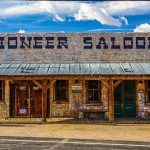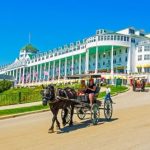 History
History  History
History  Health
Health 10 Everyday Activities That Secretly Alter Consciousness
 History
History Top 10 Historical Disasters Caused by Someone Calling in Sick
 Animals
Animals 10 New Shark Secrets That Recently Dropped
 Movies and TV
Movies and TV 10 Forgotten Realities of Early Live Television Broadcasts
 Technology
Technology 10 Stopgap Technologies That Became Industry Standards
 Weird Stuff
Weird Stuff 10 Wild Facts About Taxidermy That You Probably Didn’t Know
 Travel
Travel 10 Beautiful Travel Destinations (That Will Kill You)
 Miscellaneous
Miscellaneous 10 Modern Marriage Rituals Born from Corporate Branding
 Weird Stuff
Weird Stuff Ten Bizarre Visions of 2026 from Fiction
 History
History 10 “Modern” Problems with Surprising Historical Analogs
 Health
Health 10 Everyday Activities That Secretly Alter Consciousness
 History
History Top 10 Historical Disasters Caused by Someone Calling in Sick
Who's Behind Listverse?

Jamie Frater
Head Editor
Jamie founded Listverse due to an insatiable desire to share fascinating, obscure, and bizarre facts. He has been a guest speaker on numerous national radio and television stations and is a five time published author.
More About Us Animals
Animals 10 New Shark Secrets That Recently Dropped
 Movies and TV
Movies and TV 10 Forgotten Realities of Early Live Television Broadcasts
 Technology
Technology 10 Stopgap Technologies That Became Industry Standards
 Weird Stuff
Weird Stuff 10 Wild Facts About Taxidermy That You Probably Didn’t Know
 Travel
Travel 10 Beautiful Travel Destinations (That Will Kill You)
 Miscellaneous
Miscellaneous 10 Modern Marriage Rituals Born from Corporate Branding
 Weird Stuff
Weird Stuff Ten Bizarre Visions of 2026 from Fiction
Ten Tiny American Towns with Unbelievably Obscene Names
There are thousands and thousands of cities and towns all across America. And all over the world, people know many of them. On pretty much every corner of the globe, you’ll find people who recognize New York City, Los Angeles, Chicago, and many more. But those towns aren’t our focus today. Instead, we’re looking at some of the strangest small towns to ever be named across the United States.
That’s right—in this list, we are going to walk the line between PG content and risqué discussions. That’s because we are going to give you the rundown of the ten most inappropriately named towns in the United States! You might need to take a shower after reading this list or at least wash your hands. We felt dirty just by compiling it!
Related: 10 Places with Fascinating Stories to Tell
10 Tightsqueeze, VA
Let’s start with maybe the least offensive town name on this entire list: Tightsqueeze, Virginia. Located in Pittsylvania County, this tiny town got its name in the most interesting way: by having two 19th-century storefronts built too close together along a road. As the story goes, a general store in Pittsylvania County was opened in 1870 by a man named W.H. Colbert. He built his store right next to the edge of the street. Then, a few years later, a man named Isiah Giles bought the property right across the street from Colbert and put a blacksmith-wheelwright shop on that corner.
Colbert and Giles were so concerned with commerce and building their businesses that they didn’t think about the street between them. See, each one had built their stores so close to the edge of the road that buggies and carriages could just barely squeeze past each building. The road was so narrow between the two stores that it soon became a notorious spot all across Pittsylvania County.
People from all over the region began to warn each other of the “tight squeeze” along the road between the two stores. Over time, the name stuck, and when a town popped up around Colbert’s and Giles’s shops, it came to be known as “Tightsqueeze.” See? This one has a perfectly normal and “safe for work” explanation. Get your mind out of the gutter! (Or, out of the narrow street, as it were.)[1]
9 Reamstown, PA
Back in 1717, a man named Johann Eberhardt Riehm came to the United States from his hometown of Liemen, Germany. He eventually settled in an area of what would come to be known as Lancaster County, Pennsylvania. When Johann—who was mostly known in America by his middle name—settled there, the town that popped up around him was known as Zoar. Riehm put down roots in the area and grew a family. He even received permission from the local indigenous group of people, the Cocalico, to settle and live peacefully.
Eventually, Riehm’s offspring grew the region into a full tract of workable land. And in time, the man Americanized his last name, too, going from “Riehm” to Ream. With the blessing of William Penn and the legal documents backing it, Johann’s grandson Tobias Ream was officially deeded the entire area as his property in 1760. With that, the name of the town changed. What was once called Zoar suddenly became Reamstown.
Over the next three centuries, Reamstown never grew to be very much. Even today, the now-unincorporated town only claims a bit less than 4,000 local residents. But its name certainly draws some eyebrow raises and guffaws from the less mature among us. Sure, the history of the town’s name is about as basic as it comes—a place named for the family that first settled there. But the suggestive name nevertheless makes us giggle. Ain’t nothin’ wrong with that![2]
8 Spread Eagle, WI
Okay, let’s get freaky. Up in the vast northern stretches of Wisconsin, right along the state’s border shared with Michigan’s Upper Peninsula, lies a tiny town called Spread Eagle. As far as suggestive names are concerned, this one might take the cake. The area itself is super secluded and very rural. Most residents aren’t full-time locals but people from elsewhere in Wisconsin and the rest of the Midwest who own summer cabins and hunting lodges there. So it’s a pretty desolate place. But its name has drawn a ton of attention to Spread Eagle, even if a robust population hasn’t followed.
But how did it get its name, anyway? One longstanding rumor claims that Al Capone owned a brothel in Spread Eagle and, uh, the women who worked there gave the town its colorful moniker. But while Capone apparently really did spend some time in the area during his life, that’s not the reason behind the name. Sadly, the origin of Spread Eagle’s title is far simpler (and dumber) than that.
If you go on Google Maps and search for Spread Eagle, Wisconsin, you are sure to see it. Seen from the sky, the area’s Chain of Lakes that sits just outside the tiny town looks exactly like an eagle with its wings spread. That’s what we’re told, at least. We Googled it, and we’re going to be honest… we don’t really see the eagle. But maybe you will! Perhaps this is some kind of very strange Rorschach Test, and we failed it miserably![3]
7 Tillicum, WA
When it comes to American slang, few town names are more salacious than the tiny village of Tillicum, Washington. Heard one way, and it’s quite an, um, assertive and sensual command. But if you go back to its language of origin—that of the Chinook people—it actually has a far more wholesome meaning. In the Chinook jargon, the word “Tillicum” basically means “Average Joe.” It was used by that indigenous group to refer to regular, everyday people. Not tribal chiefs, not local leaders, and not dignitaries of any kind—just everyday folks living their lives and raising their families. Think of it as the Chinook’s version of “salt of the earth” people!
Over time, Chinook words like tillicum took on major importance because that group’s language eventually evolved into something called “Chinook Wawa.” That was a pidgin version of the Chinook language that was used by dozens of regional indigenous groups as well as American and European travelers alike throughout the 19th century. They would speak the simplified pidgin language to each other to trade goods. In time, words like “tillicum” became so well-known that it was inevitable it would be used for town names. People back then just had no way of knowing what it would mean in modern English. Awkward![4]
6 Hooker, OK
Texas County, Oklahoma, is a small and desolate spit of land in the Sooner State’s panhandle region just north of the furthest reaches of north Texas. There isn’t much there besides cattle, wide-open grasslands, and a few resilient farmers who have stayed their course. Oh, and there’s Hooker. How could we forget about Hooker?!
In 1873, a man named John Threlkeld showed up in the Oklahoma Panhandle. He was there to run cattle through a wide and rough 40-mile (64.4-kilometer) region that nobody else wanted a part of. The land was too rough to farm, too tough to tame, and even too difficult for cattle to thrive, they said. Threlkeld felt otherwise, and he started a successful ranching business. Eventually, he became so good at roping and working with cattle that he took on the nickname “Hooker.” In the context of Threlkeld’s life, that name came about because he was one of the best cattle ropers in the entire region. He could hook ’em like nobody else!
After a few years of Threlkeld’s slow but sustained success in the furthest northwest corner of Oklahoma, more people started showing up. Eventually, there was enough there to constitute a town. And so, Hooker was born! Rather than name the town Threlkeld—which is hard to say—the locals decided to honor Hooker’s nickname in their charter. And it’s stuck around ever since! So, when it comes to the small town of Hooker, just remember this: It ain’t a vocation; it’s a location.[5]
5 Climax, MI
Many towns across America have adopted the name Climax, believe it or not. But none is funnier than the story behind Climax, Michigan. As the story goes, in 1834, a man named Caleb Eldred was traversing the then-barren plains of Michigan with his family. Eldred had spent months searching for a plot of land that he felt would be adequate for farming. But up until that point, he couldn’t find anything that really spoke to him. That is until one day when the Eldred family showed up at what would later become Climax.
Sensing that the ground was slightly more fertile in that part of the prairie, Eldred suddenly became optimistic. But just to be sure that the area was the best he could find, he asked his son Daniel to climb a tree and look out across the plains. Daniel hoofed it up the trunk and got way up high in the tree. As he looked around in every direction at the land laid out before him, he called down to his father with these now-immortal words: “This caps the climax of everything we saw.” And so the area came to be known as Climax!
Well, at first, it was technically known as Climax Prairie. The Eldred family built their home there, and over the next forty years, the two-word name stuck. But in 1877, the town officially shortened its name just to Climax. It rolled off the tongue better than “Climax Prairie,” after all. And today, sitting roughly halfway between Chicago and Detroit and not far outside Kalamazoo, Climax is still going strong for the 800-ish people who are fortunate enough to call it home.[6]
4 Horneytown, NC
When you’re on your way to Climax, you have to go through Horneytown first. We’re actually not kidding about that—like Michigan, North Carolina also has a town named Climax. And even funnier is that it’s extremely close to Horneytown! The village of Horneytown only has a few dozen people living in the area right now. But back in the day, it was a bustling small town named after the area’s first settlers: the Horney family. They established a farm and some businesses in the area long before the Civil War. And since they were so successful at the time, they named the town after themselves. Little did they know what “horny” would come to mean in modern American English!
As we said, this hilariously named North Carolina town is only 26 miles (42 km) away from the village of Climax, NC. That’s not all, either. Just 47 miles (76 km) away from Horneytown is the village of Erect. Yes, there’s a town named Erect, one named Climax, and one named Horneytown—all laid out in a row. Erect was founded in the early 18th century by a group of German settlers who came to the area to farm. They were known for their exquisite pottery skills, too. And they also founded some other towns with funny names nearby, including Steeds, Whynot, Hemp, and Lonely. But it’s Horneytown, Climax, and Erect that have us all hot and bothered.[7]
3 Intercourse, PA
It’s crazy to think that a town in Pennsylvania’s Amish Country could have such a sordid name. After all, aren’t the Amish supposed to be chaste? But the town of Intercourse, Pennsylvania, might suggest otherwise. That is until you learn the strangely-named city’s backstory. The village was first founded in 1754 and called Cross Keys after a local tavern. In 1814, it officially changed its name to Intercourse. There are a few theories as to why the name change went through, too—and none of them have anything to do with, uh, ya know, THAT kind of intercourse…
One theory holds that a local horse racing track in the area gave the town its new name in 1814. That track was supposedly called Entercourse, which could have morphed into “Intercourse” over time. Another theory contends that the town’s name change happened because the area hosted a major intersection of two important roads through the region—the Old King’s Highway, which is now known as the Philadelphia Pike, and a highway that runs from the city of Erie all the way to Wilmington, Delaware.
The third name change theory might be the bullseye, though. In this option, historians cite the fact that “intercourse” previously meant something different than its definition in the modern age. In the past, “intercourse” referred to fellowship and (non-sexual) social interaction between community members. Thus, the folks who lived in Intercourse must have been particularly community-minded when they opted to change the name. And they obviously had no way of knowing what it would come to mean in the 21st century![8]
2 Rough and Ready, CA
In northern California, in Nevada County, which borders the nearby state of the same name, sits a tiny town called Rough and Ready. No, it isn’t named for what you think it is, so get your mind out of the gutter. But if you’re a history buff with a particular focus on past American presidents, you might already know exactly why this town was named as it was. Its origin comes from none other than the 12th President of the United States of America—the famed former military leader Zachary Taylor.
President Taylor’s nickname in the military (and long afterward, too) was “Old Rough and Ready.” He was one of the toughest and most shrewd military generals of his day when he was serving. By the time he became president, his military prowess spoke for itself. So, it made sense that people who admired Taylor and loved his work would seek to name things after him. Hence, this tiny California town was getting an incredibly suggestive (but also incredibly patriotic) name!
As for the specifics of naming the town Rough and Ready (and not, like, Taylorville or something that might have made more sense), here’s how it went down. In 1849, amid the chaos of the California Gold Rush, a Wisconsin-based mining company known as the Rough and Ready Company showed up to search for gold. That company had been founded by a man named A.A. Townsend—a former Army captain who was incredibly impressed by Taylor’s leadership. As the company descended on the gold fields, their camp turned into a town, and now, here we are today![9]
1 Cumming, GA
Let’s wrap our list with undoubtedly the most scandalously-named town in all of America. Yes, that would be Cumming, Georgia. We honestly can’t even believe this small town’s name hasn’t been changed yet! But no matter—here we are. Set in the Peach State’s Forsyth County, Cumming was first founded by American settlers in 1834 after being the longtime home of the local Cherokee tribal population.
There are two possible inspirations for the town’s name: either Colonel William Cumming, who was a prominent military man from nearby Augusta, or Sir Alexander Cumming, who was a baron’s son who emigrated to the United States in the early 18th century and settled in the area. Regardless, a post office was established in Cumming in January of 1834, and by the end of that year, the state legislature officially incorporated it. Locals had high hopes for the town after it was named the county seat of Forsyth County that year, too. But almost immediately, its fortunes fell.
In the 1830s and 1840s, the laying of railroads across Georgia missed Cumming completely, costing the area key business contracts. Then, the nation’s westward expansion and the California Gold Rush of 1849 combined to draw people away from Cumming. Heck, even Union General William T. Sherman completely bypassed Cumming during his infamous Civil War run through Georgia. And today, Cumming’s population still hasn’t hit 10,000 folks.[10]








